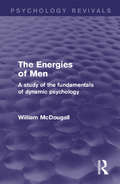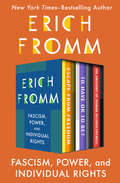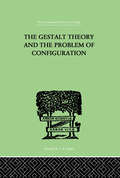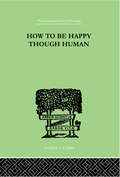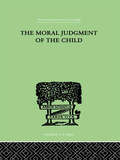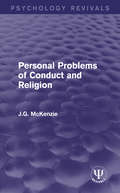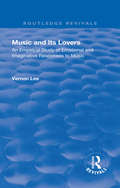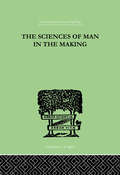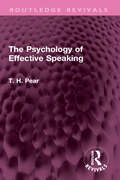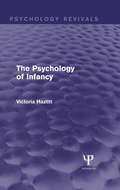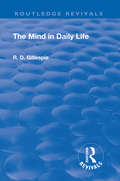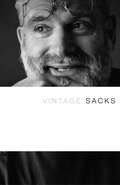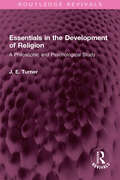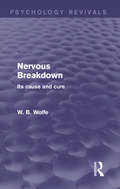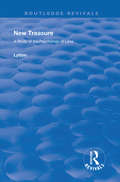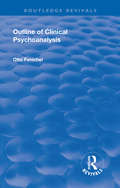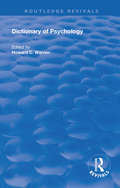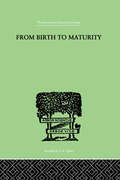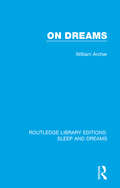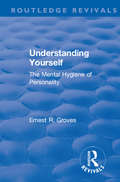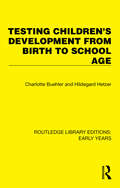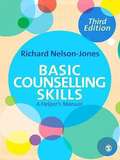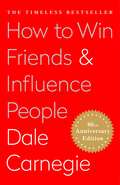- Table View
- List View
The Energies of Men: A Study of the Fundamentals of Dynamic Psychology (Psychology Revivals)
by William McDougallFirst published in 1932, the original blurb states: "This is a simplified condensation of the author’s two volumes, An Outline of Psychology and An Outline of Abnormal Psychology, which together give a comprehensive survey of the principles and findings of modern psychology. This is designed as an introduction to the scientific study of man and society for those who have not time or inclination to pursue the more recondite problems of mind. It is suitable for college use in the introductory course. It concentrates on the dynamics of the human organism and aims to give the student that minimum acquaintance with psychology without which he is not fitted to be a citizen of the modern world." Today it can be read and enjoyed in its historical context.
Fascism, Power, and Individual Rights: Escape from Freedom, To Have or To Be?, and The Anatomy of Human Destructiveness
by Erich FrommThree fascinating examinations of the psychology of political power from the New York Times–bestselling author of The Art of Loving. Philosopher and social theorist Erich Fromm is renowned as “a psychologist of penetration and a writer of ability” (Chicago Tribune). In these three riveting works, Fromm sheds light on some of the most critical dilemmas facing humanity. Escape from Freedom: Though freedom has been a prized value in Western culture for centuries, it is often accompanied by feelings of anxiety and powerlessness. Fromm’s compelling study demonstrates how these feelings of alienation can lead to a desire for conformity and authoritarianism, bringing invaluable insight into the rise of Nazism and fascism in Europe. To Have or To Be?: Life in the modern age began when people no longer lived at the mercy of nature and instead took control of it. Fromm argues that through the process of modern materialism, the natural tendency of humankind moved away from practicing human abilities, and instead focused on possessing objects. Humankind therefore began using tools that replace our own powers to think, feel, and act independently. Fromm argues that positive change—both social and economic—will come from being, loving, and sharing. The Anatomy of Human Destructiveness: This classic study makes a distinction between animal aggression and certain forms of destructiveness that can only be found in human beings. His case studies span zoo animals, necrophiliacs, and the psychobiographies of notorious figures such as Hitler and Stalin, offering a comprehensive exploration of the human impulse for violence. This ebook features an illustrated biography of Erich Fromm including rare images and never-before-seen documents from the author’s estate.
The Gestalt Theory And The Problem Of Configuration (International Library Of Psychology Ser.)
by Bruno PetermannThis is Volume VIII of a series of twenty-one on Cognitive Psychology. Originally published in 1932, this study looks at the problem of configuration and the Gestalt Theory, its empirical foundation and dynamics.
How To Be Happy Though Human (Routledge Research International Library of Psychology)
by Wolfe, W BeranFirst published in 1999. Routledge is an imprint of Taylor & Francis, an informa company.
The Moral Judgment Of The Child (International Library Of Psychology Ser.)
by Piaget, JeanFirst Published in 1999. Routledge is an imprint of Taylor & Francis, an informa company.
Personal Problems of Conduct and Religion (Psychology Revivals)
by J.G. McKenzieOriginally published in 1932, Professor McKenzie, author of ‘Souls in the Making’, had been deeply interested for years in helping those afflicted with nervous troubles, moral conflicts, or religious doubts. Each chapter of this book deals with some concrete problem which he had actually faced with one of his patients. He was convinced that many of the severer forms of neuroticism could be prevented if treated with understanding, and that many a parent could have been saved from making a fatal mistake in coping with a ‘difficult’ child, if they had only been taught to deal with such. The practical character of this book can best be judged by a glance at a few of the topics discussed: ‘An Adolescent Problem’, ‘The Problem of Growing Up’, ‘The Troubles of Old Age’, ‘Psychology of Sleeplessness’, ‘The Delinquent Child’, ‘Our Regrets and Our Fears’, ‘Psychology of Faith’.
Revival: Music and Its Lovers (Routledge Revivals)
by Vernon LeeAn empirical study of imaginative responses to music.
The Sciences Of Man In The Making: AN ORIENTATION BOOK (International Library Of Psychology Ser.)
by Edwin A. KirkpatrickThis is Volume XVII of thirty-eight in collection on General Psychology. Originally published in 1932, this is an orientation text on the sciences of man in the making and looks at man as an inhabitant of the earth, how life is preserved, varieties of the human species, avoiding waste and the behaviour of man amongst more.
Experience and its Modes
by Michael OakeshottWhen it first appeared in 1933, Experience and its Modes was not considered a classic. But as philosophical fashion moved away from the analytic philosophy of the 1930s, this work began to seem ahead of its time. Arguing that experience is 'modal', in the sense that we always have a theoretical or practical perspective on the world, Michael Oakeshott explores the nature of philosophical experience and its relationship to three of the most important 'modes' of non-philosophical experience - science, history and practice - seeking to establish the autonomy and superiority of philosophy. In recognition of its enduring importance, this book is presented in a fresh series livery for a new generation of readers, featuring a specially commissioned preface written by Paul Franco.
The Psychology of Effective Speaking (Routledge Revivals)
by T. H. PearFirst published in 1933, The Psychology of Effective Speaking studies voice as an expression of personality. This book also criticises the education of its time, but not always destructively. It asks why, since people speak, they should not speak better. It suggests that if democracy is to succeed, rapid increase in the effectiveness of vocal communication is urgently necessary, and that this improvement begin in the lower classes of the schools. This book will be of interest to students of rhetoric, communication and psychology.
The Psychology of Infancy (Psychology Revivals)
by Victoria HazlittOriginally published in 1933, this volume was the result of many years’ careful first-hand study of child psychology enriched by the author’s unusually wide experience in dealing with the subject with students. It was intended to follow the development of children from infancy to adolescence, but was cut short due to the author’s untimely death. The book makes available the results of modern experimental work of the time, much of which was published in scattered journals. Chapters deal with the development of sensory and muscular control, including walking and talking, and with the development of the intellectual, emotional and social life of children up to three years of age. A pioneer in the development of experimental psychology Hazlitt’s work can now be enjoyed again in its historical context.
Revival: The Mind In Daily Life (1933) (Routledge Revivals)
by R. D. GillespieThis book is an elementary exposition. It contains no more technically than seemed readily understandable by the intelligent layman and the medical student desiring a merely general introduction to modern views on the motives of human conduct and the mental processes of which that conduct is the expression. Part I gives some account of processes and motives that are universal and therefore normal. Part II is written from the angle of the physician who sees the results, always common but nowadays more frequently discussed, of the miscarriage of the normal development of human beings as such.
Vintage Sacks
by Oliver SacksVintage Readers are a perfect introduction to some of the great modern writers presented in attractive, accessible paperback editions."It is Dr. Sacks's gift that he has found a way to enlarge our experience and understanding of what the human is." --The Wall Street JournalDubbed "the poet laureate of medicine" by The New York Times, Oliver Sacks is a practicing neurologist and a mesmerizing storyteller. His empathetic accounts of his patients's lives--and wrily observed narratives of his own--convey both the extreme borderlands of human experience and the miracles of ordinary seeing, speaking, hearing, thinking, and feeling. Vintage Sacks includes the introduction and case study "Rose R." from Awakenings (the book that inspired the Oscar-nominated movie), as well as "A Deaf World" from Seeing Voices; "The Visions of Hildegard" from Migraine; excerpts from "Island Hopping" and "Pingelap" from The Island of the Colorblind; "A Surgeon's Life" from An Anthropologist on Mars; and two chapters from Sacks's acclaimed memoir Uncle Tungsten.From the Trade Paperback edition.
Essentials in the Development of Religion: A Philosophic and Psychological Study (Routledge Revivals)
by J. E. TurnerFirst published in 1934, Essentials in the Development of Religion was written with the conviction that the psychological and philosophical analysis of all phases of religious experience, even those which may be accounted the highest, is capable of yielding results of inestimable importance which could be attained in no other way. Dr. Turner discusses the historical development of the philosophy of religion and reveals topics that have been presupposed or embodied in regular human life. The book will be of interest to students of philosophy, religion and psychology.
Nervous Breakdown: Its Cause and Cure (Psychology Revivals)
by W. B. WolfeOriginally published in 1934, excerpts from the original preface read: "A Nervous breakdown is a terrifying experience. When it occurs, the patient, his family, and often his friends are panic-stricken. No one knows just what to do with the patient, and the patient is incapable of helping himself. … What should be done? If you think you have a nervous breakdown, it is your first duty to consult a competent and reputable physician, preferably your family doctor, and get a thorough and complete physical examination. If you cannot find any evidence of physical or organic disease, ask your doctor to recommend a reputable psychiatrist or medical psychologist. …This is a compact manual of help and self-help." Today this book can be read and enjoyed in its historical context.
New Treasure: A Study of the Psychology of Love (Routledge Revivals)
by LyttonFirst published in 1939, Lytton combines the essence of Sophocles quote "I was not born to share men’s hatred but their love" and draws on the work of Homer Lane to relate it back to Christian philosophy and teachings in this his homage to Christianity itself.
Revival: Outline of Clinical Psychoanalysis (Routledge Revivals)
by Otto FenichelA comprehensive presentation of the dynamics of neurosis, with valuable clinical material and a discussion of treatment; translated from the German. The wealth of clinical and theoretical data which psychoanalysis has been gathering for almost forty years as yet awaits an adequate systematization. A number of summaries and more or less complete systematic reviews of the field of psychoanalysis have been attempted and a number of them, of greater or less value, have been published with either the specialist or the general medical or or lay public in mind. Dr. Fenichel’s Outline is not one of these attempts. It is rather a systematized and almost impersonal presentation of clinical data which psychoanalysis has collected in the course of almost forty years and Dr. Fenichel frankly sacrifices simplified clarity to systematic completeness. The clinician will find it a very useful reference book; the general medical reader or the psychologist will find it to be a plain statement of fact made without prejudice or special preference to any of the variety of currents in present day psychoanalytical thought. It is the first outline of what the psychoanalytical trends are in the field of clinical work, leaving out the controversial attitudes which are always to be found in a living scientific discipline that has not yet become dogmatized.
Dictionary of Psychology (Routledge Revivals)
by Howard C. WarrenFirst published in 1935, this volume was designed to explain a range of technical psychological terms along with some amendments on usage. Howard C. Warren includes terms from fields related to 1930s psychology, such as folk-lore, religion, education and physiology, as well as more frequently used foreign terms.
Ethnicity and Empire in Kenya
by Myles OsborneThis book is about the creation and development of ethnic identity among the Kamba. Comprising approximately one-eighth of Kenya s population, the British considered the Kamba East Africa s premier "martial race" by the mid-twentieth century: a people with an apparent aptitude for soldiering. The reputation, indeed, was one that Kamba leaders used to leverage financial rewards from the colonial state. However, beneath this simplistic exterior was a maelstrom of argument and debate. Men and women, young and
From Birth to Maturity: An Outline of the Psychological Development of the Child (International Library Of Psychology Ser. #Vol. 67)
by Bhler, CharlotteFirst published in 1999. Routledge is an imprint of Taylor & Francis, an informa company.
On Dreams (Routledge Library Editions: Sleep and Dreams #1)
by William ArcherOriginally published in 1935, William Archer’s interest in dreams had persisted for over quarter of a century, for ten years of which he kept a careful record of his own dreams. These records alone form a valuable collection of material, of which Archer made good use in the writing of the book on dreams on which he was engaged at the time of his death; large parts of these dream-records are reproduced in this book. He left this book partly finished, partly in draft, and partly in the form of notes. In putting together this material the editor, Theodore Besterman, tries to carry out Archer’s intentions as closely as possible, and believed that he represented the book as he would have wished it to appear. It was unquestionably an important contribution to a difficult subject at the time, the result of many years’ study and reflection.
Revival: Understanding Yourself: The Mental Hygiene Of Personality (1935) (Routledge Revivals)
by Ernest R. GrovesThis book has a practical purpose. It seeks to help the reader to understand himself and his problems, that he may increase his successes, his fruit, and his satisfactions. The discussion centers about the conditions that shape personality, but the attempt of the book is not to rehearse the findings and theories of science but to provide the means by which the reader can come to a better understanding of himself.
Testing Children's Development from Birth to School Age (Routledge Library Editions: Early Years)
by Charlotte Buehler Hildegard HetzerOriginally published in 1935, Testing Children's Development from Birth to School Age highlighted the greatly increased interest in measuring the development of pre-school children by other means than the older, inadequate "intelligence tests". In the early part of the twentieth century the work done at the Psychological Institute of the University of Vienna under the general direction of Dr Karl Buehler had become favourably known throughout Europe and the United States. This was also especially true of the studies in child psychology directed by the authors Dr Charlotte Buehler and her one-time assistant, Dr Hildegard Hetzer. The book contains developmental tests for the first six years of life; techniques for testing small children; information on the construction of tests and the evaluation their results. Today it can be read and enjoyed in its historical context.
Basic Counselling Skills
by Richard Nelson-JonesFrom leading skills expert Richard Nelson-Jones, this third edition remains the most accessible and practical introduction to the basic counselling skills essential for the helping professions. Steeped in vivid case examples, experimental activities and therapeutic dialogue, this book provides a thorough, step-by-step guide to the subject, working through each stage of the helping process. The key skills covered include: - Starting, structuring and summarizing the helping process - Active listening - Offering challenges and feedback - Facilitating problem solving - Improving clients' self-talk, rules and perceptions - Coaching, demonstrating and rehearsing - Managing resistance and changing referrals - Conducting middle sessions and terminating help Accessible, practical and concise, this bestselling book also discusses ethical issues and dilemmas, multicultural and gender aware helping, providing a master class for anyone using counselling skills in the course of their work.
How To Win Friends and Influence People: Large Print Edition (Deluxe Hardbound Edition Ser.)
by Dale CarnegieYOU CAN GO AFTER THE JOB YOU WANT...AND GET IT! YOU CAN TAKE THE JOB YOU HAVE...AND IMPROVE IT! YOU CAN TAKE ANY SITUATION YOU'RE IN...AND MAKE IT WORK FOR YOU! For more than sixty years the rock-solid, time-tested advice in this book has carried thousands of now famous people up the ladder of success in their business and personal lives. Now this previously revised and updated bestseller is available as eBook for the first time to help you achieve your maximum potential throughout the next century! Learn: * THREE FUNDAMENTAL TECHNIQUES IN HANDLING PEOPLE* THE SIX WAYS TO MAKE PEOPLE LIKE YOU* THE TWELVE WAYS TO WIN PEOPLE TO YOUR WAY OF THINKING* THE NINE WAYS TO CHANGE PEOPLE WITHOUT AROUSING RESENTMENT
